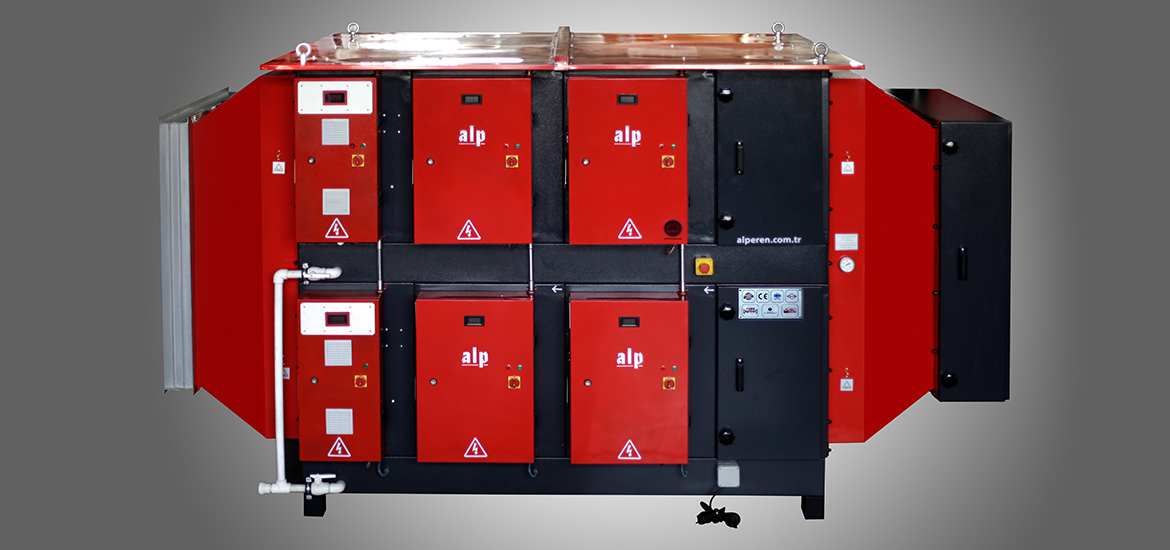
Energy Efficiency in Air Handling Units
Today, energy consumption and environmentally friendly solutions are among the top priorities in almost every field of industry, including the HVAC sector. Air handling units (AHUs), in particular, are widely used in various areas from commercial buildings to industrial facilities. While these systems are among the essential devices used to provide a comfortable indoor environment, they also consume a large amount of energy. Therefore, achieving energy efficiency in air handling units is critically important both economically and environmentally.
What Are Air Handling Units?
Air handling units are systems that perform heating, cooling, ventilation, humidity control, and filtration in buildings. These units are used to convert various atmospheric conditions into comfortable indoor environments. Essentially, they control factors such as temperature, humidity, air quality, and airflow. AHUs play a key role in ventilation and HVAC systems. If their design and management are not done correctly, high energy consumption and waste can occur.
What Is Energy Efficiency?
Energy efficiency refers to getting the maximum benefit from the energy used. An energy-efficient system consumes less energy to achieve the same results, which reduces costs and environmental impact. In AHUs, energy efficiency is generally achieved by optimizing all system processes. This optimization becomes possible through proper design, the use of modern technologies, and regular maintenance.
Methods to Achieve Energy Efficiency in Air Handling Units
1. Advanced Compressor Technologies
Energy efficiency in AHUs is directly related to the efficiency of the compressors used. Compressors consume energy by compressing the refrigerant and account for a significant portion of the system’s energy consumption. With new-generation inverter compressors and variable-speed technologies, compressors operate only at the energy level required. This saves energy and optimizes system performance.
2. Heat Recovery Systems
Heat recovery systems are an effective method for achieving energy efficiency in AHUs. Waste heat from cooling or heating processes can be recovered. In this way, the energy consumption of heating and cooling systems used inside the building is significantly reduced. Heat recovery units enhance energy efficiency while providing budgetary protection.
3. Smart Climate and Control Systems
One of the most important factors in ensuring energy efficiency in AHUs is the use of proper control systems. Building Automation Systems (BAS) and Smart Control Systems ensure the efficient operation of air handling units. These systems monitor indoor air conditions and optimize heating or cooling processes as needed. For example, the AHU automatically starts operating based on temperature and humidity levels, preventing unnecessary energy consumption.
4. Energy-Efficient Filtration Systems
Filters not only improve air quality but also affect energy efficiency. Dirty filters block airflow, causing the AHU to consume more energy. Therefore, using efficient filtration systems such as HEPA filters, electrostatic filters, ozone filters, and activated carbon filters improves air quality and ensures efficient system operation. Regular filter maintenance and replacements are also essential for boosting energy efficiency.
5. Low-Energy Cooling Systems
In recent years, environmentally friendly cooling methods have come to the forefront in the HVAC sector. These methods consume less energy and have a lower environmental impact compared to traditional cooling techniques. Depending on the project, natural cooling systems, geothermal heat pump systems, and cooling towers are among the methods that increase energy efficiency. Eco-friendly cooling solutions reduce costs and minimize environmental damage.
6. High-Efficiency Fans and Motors
Fans used in AHUs help with climate control and filtration by circulating air. However, low-efficiency fans can increase energy consumption. EC (Electronically Commutated) motors and high-efficiency fans consume less energy while ensuring airflow. These types of fans increase overall system efficiency and save energy.
7. Building Insulation and Well-Designed Systems
Building insulation has a major impact on energy efficiency. In well-insulated buildings, AHUs can carry out climate control processes using less energy. The quality of insulation materials and optimization in building design contribute to the efficient operation of air handling units.
Energy Efficiency and Environmental Sensitivity
One of the most important topics in the HVAC sector is balancing sustainability and energy efficiency. With advances in technology, it has become possible to achieve this balance. Thanks to innovative renewable energy systems, smart management software, and high-efficiency devices, AHUs consume less energy and operate more efficiently using environmentally friendly solutions.
Advanced energy efficiency applications not only provide economic savings but also help reduce carbon emissions. Using energy-efficient systems in the fight against climate change contributes to an environmentally conscious and sustainable future.
Energy efficiency not only reduces costs for businesses but also helps develop an environmentally responsible approach. With advanced technologies, smart systems, and efficient designs, AHUs can provide more comfort with less energy. The use of such efficient systems in both commercial and industrial buildings saves energy and minimizes environmental impact.
In the future, we can expect to see more innovation in the field of energy efficiency. The HVAC sector will continue to follow these developments and produce sustainable solutions. A production model based on energy efficiency will improve the energy performance of buildings and create a healthier future for our planet.
İlker KURAN
Alperen Mühendislik Ltd. Şti.







